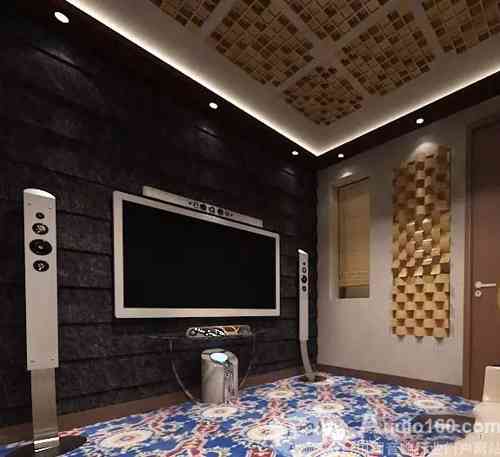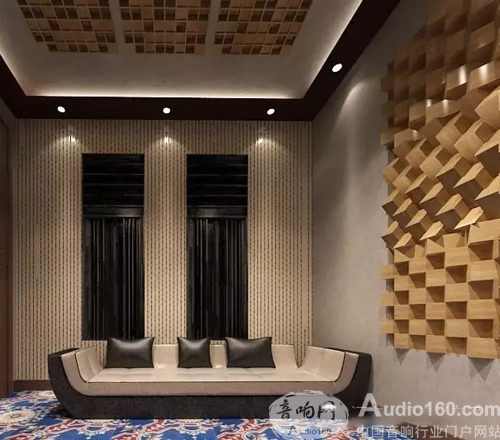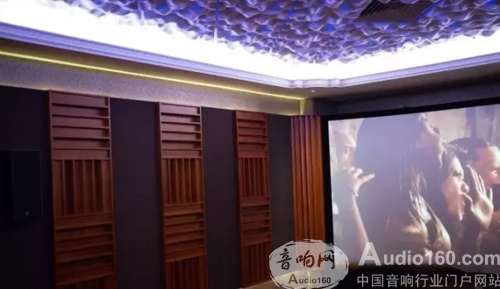The necessity of home theater acoustic design, only the sound design of audio and video equipment can play the best effect, and vice versa.
Through acoustic processing, the following problems will be solved:
1. The reverberation time is too short, the sound is dry, boring and tasteless, not friendly and natural; the reverberation time is too long, the sound is ambiguous, and it is uncomfortable, which seriously affects the sense of hearing;
2. The indoor sound field is uneven, the sound in each frequency band is unbalanced, the sound is not round, not full, and the surrounding feeling is poor.
3. Defects such as standing wave, resonance, and tremor echo, which seriously affect the sense of hearing and affect the normal use of the audio-visual room;
4. Background noise affects the quiet audio-visual environment, affecting the audio-visual experience;
5. Sound insulation and poor noise reduction will destroy the quiet living environment of the neighbors.

The sound is dry and loud, which seriously affects hearing. How to solve it?
This is caused by the reverberation time being too short or too long. By analyzing the structure of the room, the sound absorbing materials of each frequency band are reasonably arranged on the wall, the ground or the top, so that the reverberation time of the audio-visual room reaches the optimal value.

The sound is unbalanced, not full, and the surrounding feeling is poor. How to solve it?
This is caused by the poor diffusibility of the room. The diffusing characteristics of the room are good, the sound is attenuated smoothly, and the sound is evenly distributed throughout the room. Diffusion can make the indoor sound field uniform and the sound details clearer. By accurately calculating the placement of different diffusers at different locations, this problem will be completely solved.

Echo tremble, poor listening, sound defects, how to solve?

This is mainly caused by standing waves, resonances, and reflections between walls. The superposition of standing waves is closely related to the ratio of each side of the room. The resonance strength of standing waves depends on the density and hardness of the wall material. By analyzing the structure of the room, a targeted acoustic material is placed at the corresponding location to solve the above listening problem.
Industrial UPS is a specialized power protection system designed to provide backup power to critical industrial equipment in the event of a power outage or fluctuation. It is commonly used in industries such as manufacturing, oil and gas, chemical processing, telecommunications, and data centers.
Performance:
Industrial UPS systems are built to withstand harsh environmental conditions and provide reliable and stable power to sensitive equipment. They offer high levels of protection against power disturbances like surges, spikes, sags, and voltage fluctuations. These UPS systems typically have a high fault tolerance and can provide instantaneous power transfer during a power outage, minimizing downtime and preventing damage to equipment.
Industrial UPS systems can deliver power in different forms, including online, line-interactive, and offline. Online UPS systems provide continuous power protection by continuously converting AC power to DC and then back to AC. Line-interactive UPS systems regulate voltage fluctuations while being connected to the AC power source. Offline UPS systems are the simplest and provide basic power backup during outages.
Application Scenarios:
1. Manufacturing: Industrial UPS systems are crucial in manufacturing plants where downtime can result in significant financial losses. They protect critical equipment such as robotic systems, programmable logic controllers (PLCs), and control systems, ensuring uninterrupted operation and preventing data loss.
2. Oil and Gas: In the oil and gas industry, UPS systems are used to safeguard critical equipment like pumps, compressors, and control systems. They ensure uninterrupted power supply, which is crucial for maintaining safety and preventing accidents in hazardous environments.
3. Chemical Processing: Industrial UPS systems are essential in chemical processing plants where precise control of equipment is necessary. They protect sensitive instruments, control systems, and data acquisition systems, ensuring uninterrupted operation and preventing loss of valuable data.
4. Telecommunications: UPS systems play a vital role in the telecommunications industry, protecting critical communication infrastructure such as servers, switches, routers, and data centers. They provide uninterrupted power supply, ensuring continuous connectivity and preventing service disruptions.
5. Data Centers: Industrial UPS systems are widely used in data centers to protect servers, storage systems, and networking equipment. They provide backup power during outages, preventing data loss and ensuring continuous operation of critical services.
Uninterruptible power supply, Industrial-grade, Reliable, Power protection, Backup power
Bosin Power Limited , https://www.bosinsolar.com